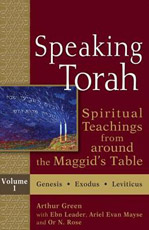Arthur Green is one of the pre-eminent authorities on Jewish thought and spirituality. He is the Irving Brudnick Professor of Philosophy and Religion at Hebrew College and rector of its Rabbinical School in Boston. Along with Ebn Leader and Or N. Rose, both on the faculty of Hebrew College, and Ariel Evan Mayse, a doctoral student at Harvard University, he has put together these teachings on the Torah drawn from a wide variety of works written by the disciples of the Ba'al Shem Tov, the great Maggid. They follow the weekly Torah reading and the Jewish festival calendar. Most of the texts in this book are talks given at the table in the course of a meal.
Volume 1 (Volume 2 is reviewed here) covers Genesis, Exodus, and Leviticus and gathers together a history of Hasidism, the great movement of spiritual revival within Judaism which took place in eighteenth-century Eastern Europe. In an overview of this ambitious project, Green states:
"The teachings of Torah, from beginning to end, are read here as a path toward liberation, a way of uplifting your soul and allowing it to journey homeward, back to its Source in the oneness of all being. Or, even better, to discover that oneness right here, in a loving but transformative embrace of both world and self."
The shared faith of Hasidism includes the following propositions:
"1. 'Avodah be-Simhah.The purpose of life is the joyous service of God. . . .
"2. Kavvanah. All of life, including the fulfillment of our physical needs, is to become an avenue of devotion. . . .
"3. Penimiyyut. The essence of religious life lies in inwardness and spiritual intensity. . . .
"4. Tsimtsum. Existence originates in the mind of God, where Being is a simple, undifferentiated whole. . . .
"5. Nitsotsot. God's presence (shekhinah) underlies, fills, and includes all of existence. . . .
"6. Tefillah. Prayer is the most essential paradigm of devotional experiences. . . .
"7. Middot. Our human task is that of uplifting and transforming our physical and emotional selves to become ever more perfect vehicles for God's service. . . .
"8. Tsaddik. The person who lives in accord with these teachings may become a tsaddik, a channel for bringing that flow of blessing not only to himself but also to those around him and ultimately to the entire world. . . ."
Green and company see Hasidism primarily as "a devotional mysticism" that is unfurled as a way of service to God. They also emphasize the ubiquity of God's presence in the midst of our days and our doings. Some of the topics covered on these pages are a Hasidic cosmology, the challenges of serving as active partners with God in perfecting Creation, the unitive vision of being, Noah as a spiritual leader, Jacob as a prototype of the seeker, the Joseph drama as an indicator of our responsibility for all our brothers and sisters, and the Hasidic spiritualization of the exile in Egypt.
